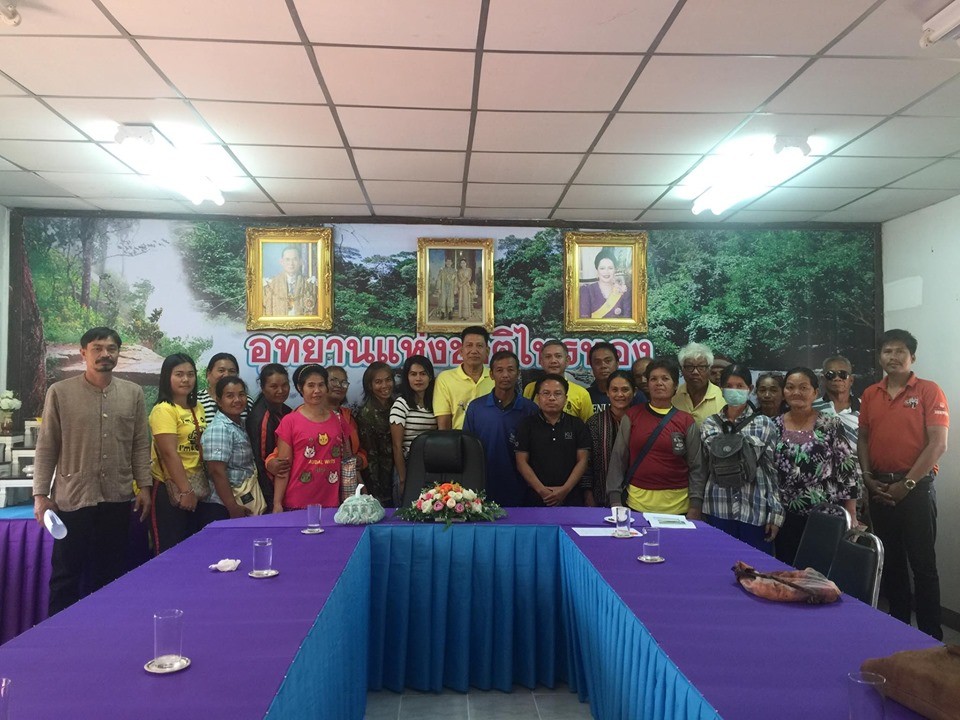CHAIYAPHUM – A light at the end of the tunnel appears for communities in Chaiyaphum’s Sai Thong National Park that have been locked in a decades-long land dispute with the government. Following a three-day protest in Bangkok by the People’s Movement for a Just Society (P-MOVE), the government has agreed to review land conflicts and consider bolstering community rights to land.
Over 30 representatives from four villages in Chaiyaphum’s Huai Yae and Tawan Khe subdistricts met with the director of Sai Thong National Park on February 13 to discuss land and resource management plans that would allow the communities to legally occupy national park land.
The meeting at the Sai Thong National Park offices was also attended by representatives from the Center for People and Forests (RECOFTC), the Isaan Land Reform Network (ILRN), as well as with officials from the Region 7 Protected Areas Office.
Suthep Ketwechsuriya, director of the Sai Thong National Park, announced that the Department of National Parks, Wildlife and Plant Conservation will set up a working group to resolve the communities’ land rights issues in accordance with the recommendations previously made by P-MOVE.
“In January [of 2020] the Ministry of Environment and Natural Resources authorized Sai Thong National Park and P-MOVE to jointly formulate a land and resource management plan within 30 days,” Suthep said at the meeting. “We have therefore invited all concerned parties to participate in making this plan, which will lead to a resolution of the problems which have occurred.”
Pramote Phonpinyo, head of the Isaan Land Reform Network, a local NGO working on land rights issues in the region, detailed the communities’ proposals on their behalf.
The communities are proposing a land and resource management plan that clearly divides the area into zones, such as land adjacent to water, buffer forest, community forest, and the land originally designated for seizure by the government.
They are also calling for the promotion of sustainable agriculture and the development of community tourism, particularly for the Hin Ru village which contains natural rock formations that are a potential tourist attraction.

Representatives from four villages in Chaiyaphum’s Sai Thong National Park, some of whom were previously prosecuted for forest encroachment, met park officials to discuss the future of their communities on February 13.
Worapol Deeprasai, a Sai Thong National Park official, said that his office had already drawn up a plan last year to verify the credentials of residents in the park and designate the land of the forest communities.
“The provincial administration must issue the order to properly survey the land. Crops may have already been planted in certain areas, utilities may have already been installed, we have to keep track of all this in accordance with the National Parks Act 2018,” said Worapol.
Rawi Thawon from RECOFTC, an advocacy group for community forestry, said that after this meeting, the working group–which will involve community participation–will be formed by the end of February. The process of determining how exactly the land will be used will begin in earnest this April.
“It is expected that a working land management plan will be presented to the governor of Chaiyaphum sometime in May 2020. The plan will be a detailed one, because this kind of solution for the five communities facing problems in Sai Thong National Park will be a pilot project for resolving other similar cases by the Ministry of Environment and P-MOVE,” Rawi said. “I’d say that good progress has been made.”
Siriwan Srikhammuan, 58, a leader of the Ban Nong Phak Waen community voiced her satisfaction in the proceedings and felt that finally some progress was being made.
“We just want to live off the land without fear of losing it all, or of being harassed by officials. That’s all,” Siriwan said.
Last year, 14 villagers living in Sab Wai, a community located in the park, have faced legal action as part of the military junta’s forest reclamation policy that had escalated land conflict across the country.
All 14 of them were accused by Royal Forest Department officials of forest encroachment according to the Forestry Act of 1941, the National Reserved Forest Act of 1964, and the National Parks Act of 1961. Upon appeal, the Court of Appeals gave them the minimum sentence of five months’ jail time and hundreds of thousands of baht in fines each. They were released on bail in August last year.
Related story:
Chaiyaphum forest community hopes for ministry to consider longstanding land conflict
Reporting by the Isaan Land Reform Network. First published in Thai on February 18, 2020. Translated and edited by The Isaan Record.




